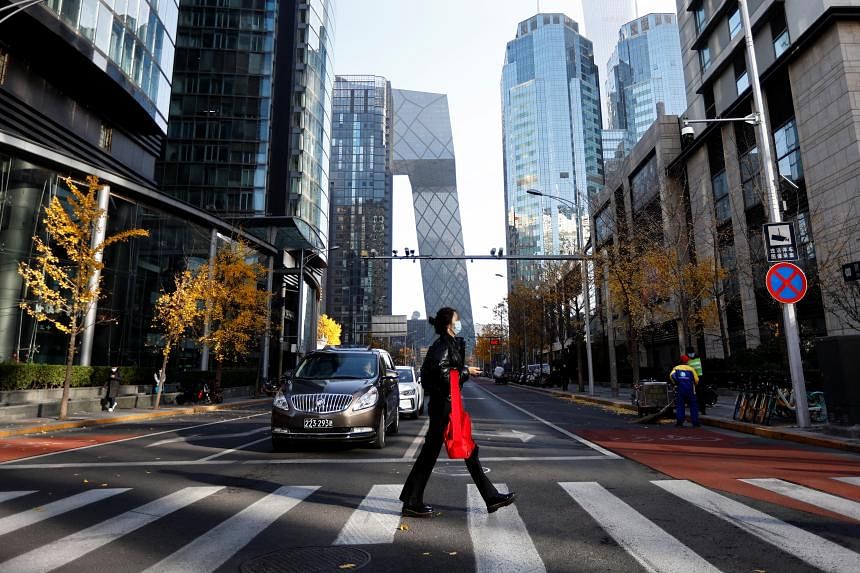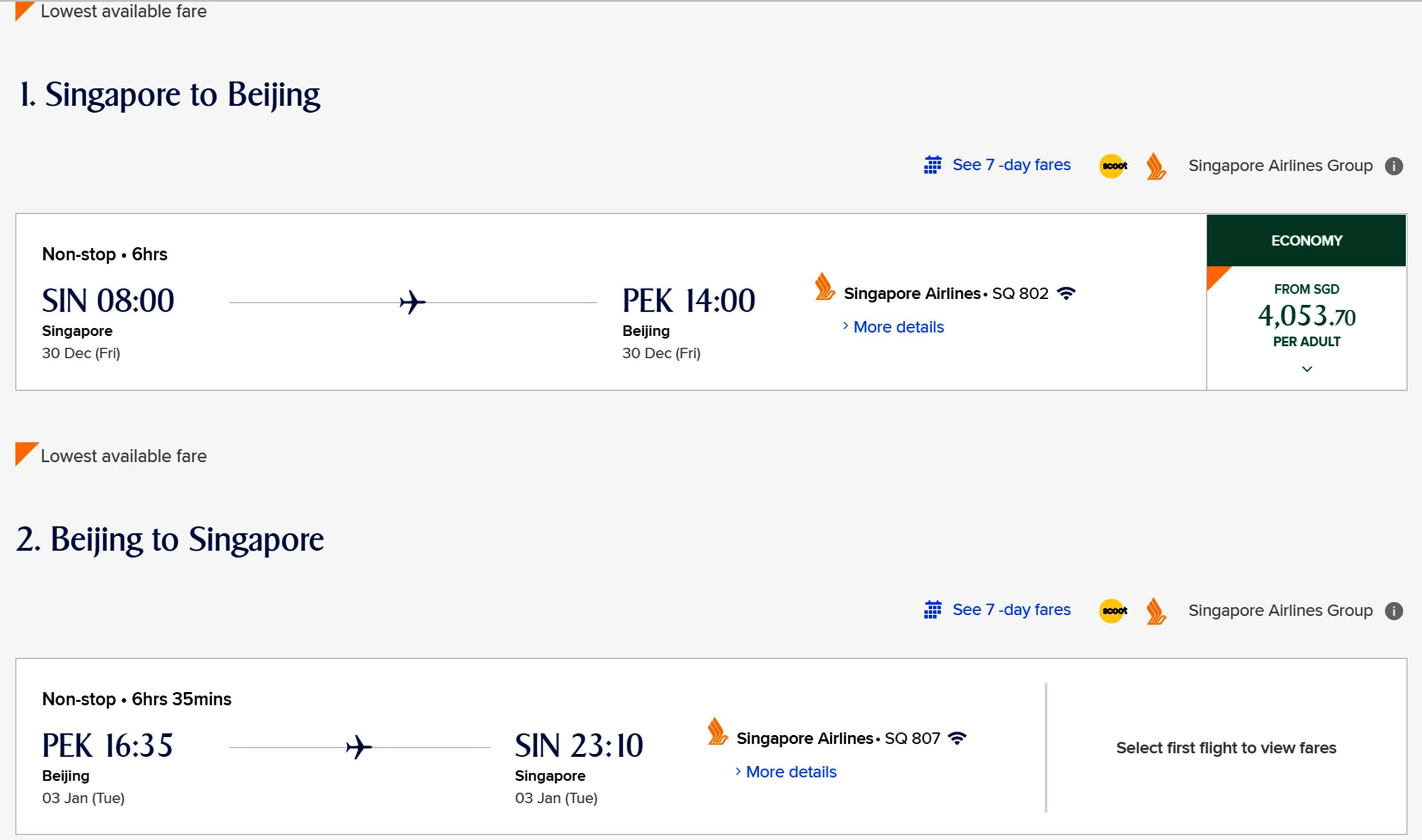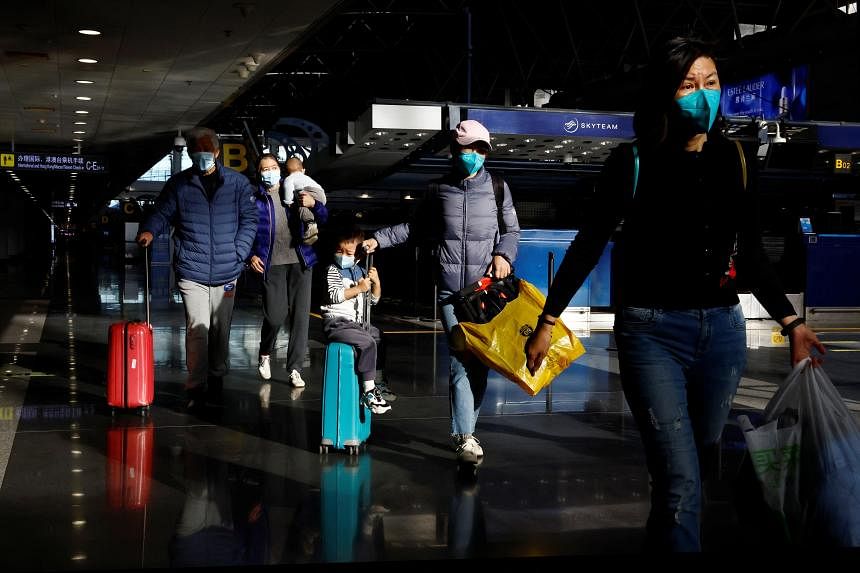- Joined
- Jul 25, 2008
- Messages
- 13,899
- Points
- 113
First flight from S’pore to Beijing on Dec 30, more such flights on SIA in coming months

A ticket for a round trip that leaves for Beijing on Dec 30 and returns to Singapore on Jan 10 costs $2,789. PHOTO: REUTERS

Nadine Chua
Dec 26, 2022
SINGAPORE – Travellers looking to visit Beijing can now do so via a Singapore Airlines flight on Friday, the first passenger flight from Singapore to the Chinese capital since the pandemic disrupted travel in 2020.
After close to three years, the national carrier is reinstating its Singapore-to-Beijing passenger service on Fridays, on a fortnightly basis.
This comes three months after SIA reinstated flights from Beijing to Singapore on Sept 27. These flights operate every Tuesday and Friday.
Flight services between Singapore and Beijing were suspended on March 28, 2020, at the height of the pandemic.
Checks by The Straits Times on Monday showed that an economy ticket from Singapore to Beijing this Friday with the return flight next Tuesday costs $4,053.
A ticket for a round trip that leaves for Beijing this Friday and returns to Singapore on Jan 10 costs $2,789.
SIA also operates flights to and from Shanghai on Mondays and Saturdays.
A check showed that a round-trip flight that departs for Shanghai this Saturday and returns to Singapore in the second week of January costs up to $5,791.
An SIA spokesman said the airline also has flights to and from Chongqing, Shenzhen, Chengdu and Xiamen, but has not resumed flight services to and from Guangzhou.
“We will continue to monitor the travel demand and work closely with local authorities to gradually resume passenger flight services between Singapore and mainland China where feasible. China is an important market for the SIA Group, and we will be ready when the Chinese government further opens up to international air travel,” said the spokesman.

Checks by The Straits Times on Monday (Dec 26) show that a round trip ticket from Singapore to Beijing costs $4,053. PHOTO: SCREENGRAB FROM SINGAPORE AIRLINES WEBSITE
In December, China did away with its zero-tolerance policy towards Covid-19, including abolishing its rules on snap lockdowns, lengthy quarantines and travel curbs.
This led to a tsunami of infections across China, made worse by the highly transmissible Omicron variant circulating in its cities.
On Sunday, China’s National Health Commission (NHC), which for the past three years has published daily Covid-19 case figures for the country, said it will no longer release such data.
The NHC’s halt to reporting daily infection numbers and deaths comes as concerns grow around the lack of vital information about China’s fight against Covid-19.
Independent analyst Brendan Sobie of Sobie Aviation said flights between China and Singapore are now at about 10 per cent of pre-Covid-19 levels.
“While this is an improvement compared with a few months ago when it was at just 3 per cent, we still have a long way to go,” he said.
“The green light to finally carry passengers from Singapore to Beijing is just one small step that follows other small steps, including the resumption of passenger flights from Beijing to Singapore in September and the opening-up of other China-Singapore routes,” he added, noting that flights to the nation’s capital are symbolically important.
Mr Mayur Patel, head of Asia at global travel data provider OAG Aviation, said the move to reinstate flights between both countries is an important strategic decision as China is an important trading partner for Singapore.
“I see it as baby steps and a measured approach to the broader reopening that China is working on. Some flights between China and the rest of the world have been reinstated, so it is significant that Singapore makes a move to ensure that its connectivity with China is restored,” he said.
Mr Jeremiah Wong, senior marketing communications manager at Chan Brothers Travel, said the travel agency has received inquiries from keen travellers asking when China will be open for tourism.
“But since China still is not open for leisure travel, the new passenger flights will likely serve returning Chinese nationals or residents, and passengers travelling for official duties and business,” he said.
Mr Patel said: “Those booking flights from Singapore to China are probably those with family there and would want to see them after close to three years.”
He added: “Even if China opens up for tourists, I don’t think people will be rushing there any time soon, based on the current wave that’s happening.“
Transport economist Walter Theseira, an associate professor at Singapore University of Social Sciences, said the timeline for the recovery of travel is unpredictable as there are typically teething problems early on. These could include tourism infrastructure in China that needs to be re-established and travel companies there that may have gone out of business during the pandemic.
“But barring non-pandemic issues such as geopolitical tensions, I fully expect that China-Singapore people movements will return to their pre-pandemic state,” he said.






